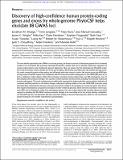Discovery of high-confidence human protein-coding genes and exons by whole-genome PhyloCSF helps elucidate 118 GWAS loci
Author(s)
Jungreis, Irwin; He, Liang; Li, Yue; Kellis, Manolis
DownloadPublished version (4.788Mb)
Terms of use
Metadata
Show full item recordAbstract
The most widely appreciated role of DNA is to encode protein, yet the exact portion of the human genome that is translated remains to be ascertained. We previously developed PhyloCSF, a widely used tool to identify evolutionary signatures of protein-coding regions using multispecies genome alignments. Here, we present the first whole-genome PhyloCSF prediction tracks for human, mouse, chicken, fly, worm, and mosquito.We develop a workflow that uses machine learning to predict novel conserved protein-coding regions and efficiently guide their manual curation. We analyze more than 1000 highscoring human PhyloCSF regions and confidently add 144 conserved protein-coding genes to the GENCODE gene set, as well as additional coding regions within 236 previously annotated protein-coding genes, and 169 pseudogenes, most of them disabled after primates diverged. The majority of these represent new discoveries, including 70 previously undetected protein-coding genes. The novel coding genes are additionally supported by single-nucleotide variant evidence indicative of continued purifying selection in the human lineage, coding-exon splicing evidence from new GENCODE transcripts using next-generation transcriptomic data sets, and mass spectrometry evidence of translation for several new genes. Our discoveries required simultaneous comparative annotation of other vertebrate genomes, which we show is essential to remove spurious ORFs and to distinguish coding from pseudogene regions. Our new coding regions help elucidate disease-associated regions by revealing that 118 GWAS variants previously thought to be noncoding are in fact protein altering. Altogether, our PhyloCSF data sets and algorithms will help researchers seeking to interpret these genomes, while our new annotations present exciting loci for further experimental characterization.
Date issued
2019-09Department
Massachusetts Institute of Technology. Computer Science and Artificial Intelligence Laboratory; Massachusetts Institute of Technology. Department of Electrical Engineering and Computer ScienceJournal
Genome research
Publisher
Cold Spring Harbor Laboratory
Citation
Mudge, Jonathan M. et al. “Discovery of high-confidence human protein-coding genes and exons by whole-genome PhyloCSF helps elucidate 118 GWAS loci.” Genome research 29 (2019): 2073-2087 © 2019 The Author(s)
Version: Final published version
ISSN
1088-9051
1549-5469